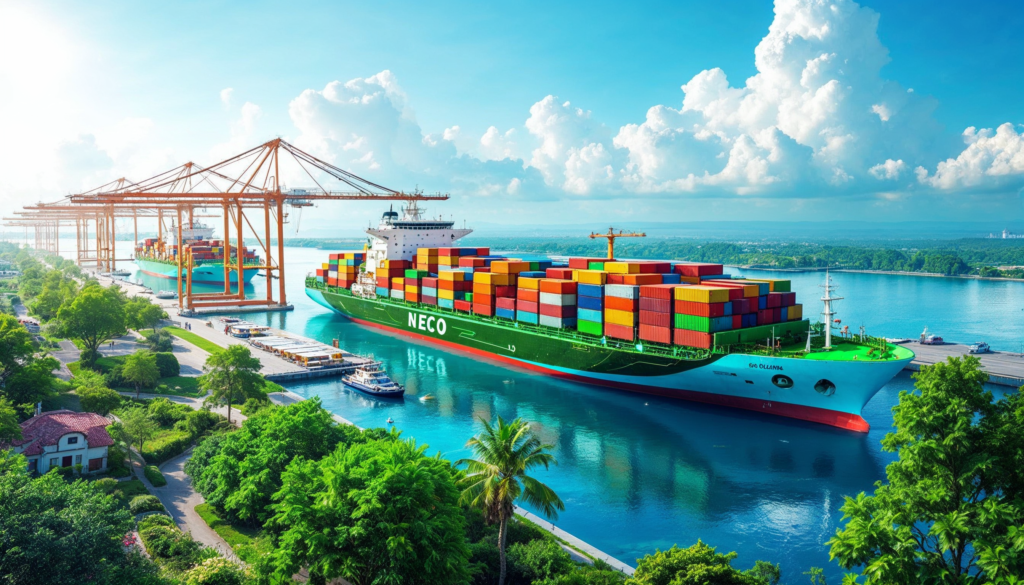Look, I’ll be honest – when I first heard about “sustainable shipping,” I rolled my eyes a bit. Another corporate buzzword, right? But after digging into the actual numbers and talking to businesses that made the switch, I’m convinced this isn’t just some feel-good initiative. There are real, measurable benefits that go straight to your bottom line.
So here’s what I’ve learned about why sustainable shipping might be the smartest business move you’re not making yet.
The Money Part (Because Let’s Be Real, That’s What Matters)

Anyway, let’s start with the obvious question – does this actually save money or just sound nice in board meetings?
Turns out, companies implementing green shipping practices are seeing cost reductions of up to 30%. Not 3%. Thirty percent. That’s because when you optimize routes, use fuel more efficiently, and switch to lighter packaging materials, you’re basically attacking waste from multiple angles.
Here’s the thing though – the savings don’t just come from one place. You’ve got fuel costs dropping when you plan better routes (obvious), but you’re also cutting packaging expenses by about 20% when you switch to lighter, eco-friendly materials. Plus, there’s this weird side effect where tracking emissions actually helps you spot inefficiencies you didn’t even know you had.
I was talking to a logistics manager last week who told me they saved over $380K just by implementing these practices across their operation. That’s not pocket change.
Your Customers Actually Care Now
This one surprised me, but 66% of consumers are factoring sustainability into their buying decisions. Not just saying they care – actually changing their purchasing behavior because of it.
And get this – 88% of customers stick with brands they see as environmentally responsible. So sustainable shipping isn’t just about doing the right thing; it’s about keeping the customers you already have while attracting new ones who care about this stuff.
Actually, there’s something else here that’s interesting. About 81% of people think companies should be actively working on environmental issues. That means if you’re not doing anything, you’re potentially alienating four out of five potential customers.
That seems… not great for business?
The Regulation Thing (It’s Coming Whether You Like It or Not)

Here’s where it gets a bit serious. Environmental regulations aren’t getting looser – they’re tightening up pretty much everywhere. By getting ahead of this now, you’re basically future-proofing your business instead of scrambling to catch up later.
But there’s actually an upside here too. A lot of governments are actually throwing money at companies that get on this train early – tax breaks, grants, the whole nine yards. So instead of getting smacked with penalties later, you could be making money off this decision right now.
It’s kind of a no-brainer when you put it like that – either you do this on your terms and maybe make some cash, or you wait until someone forces you to do it and pay through the nose for dragging your feet.
Your Brand Gets Stronger (And That’s Worth Something)
This might sound fluffy, but brand value translates to real money. When you can point to concrete sustainable practices, you’re not just another company shipping stuff. You’re a company that gives a damn about the future.
The transparency part is huge here. People want to know what you’re doing, not just that you’re doing something. When you’ve got hard numbers to show – like ‘we cut our emissions by X%’ or ‘we eliminated this much waste’ – people actually believe you. None of that vague ‘we’re committed to the environment’ nonsense that everyone sees right through.
Plus, it helps with partnerships. Companies that actually care about this stuff want to work with other companies that aren’t just talking the talk. Suddenly you’re getting invited to conversations and deals that were completely off-limits before.
The Competitive Edge You Didn’t See Coming

While everyone else is still sitting around debating whether going green is worth the hassle, you’re basically swooping in and stealing their customers who actually give a damn about the planet. You’re also accessing markets with strict environmental standards that others can’t reach.
The operational efficiencies alone give you an advantage. When you’re running 30% leaner than competitors who haven’t optimized their logistics, you can be more competitive on pricing while maintaining better margins.
Here’s something cool – businesses that establish themselves as sustainability leaders often find new partnership opportunities they wouldn’t have had otherwise. Turns out, being the eco-friendly option opens doors.
Making Your Supply Chain Actually Work Better
This is where the practical benefits really shine. When you optimize your supply chain for sustainability, you’re basically forcing yourself to eliminate inefficiencies everywhere.
Route optimization and load consolidation mean you’re maximizing every trip. Digital tracking helps you spot problems before they become expensive. Regular fleet maintenance keeps everything running smoothly while reducing emissions.
The packaging improvements alone can reduce waste by 10% over the next decade. But here’s the kicker – lighter packages cost less to ship. Period.
And when you start working with suppliers who actually get it, weird things happen. Everyone starts pulling in the same direction, and suddenly the whole operation just… works better. It makes the whole system more resilient.
Your Employees Will Actually Like Working for You More

Turns out about 70% of workers stick around longer at companies that aren’t actively destroying the planet.
Makes total sense, right? Nobody wants to spend 40 hours a week somewhere that makes them feel like crap about what they’re doing. When people can tell their friends they work for a company that’s actually trying to make things better, that means something.
Less turnover means you’re not constantly bleeding money on hiring and training new people. Plus, you start attracting the kind of employees who think beyond their next paycheck – the ones who actually care about doing good work.
The Bottom Line (Finally)
Here’s the deal – this whole sustainable shipping thing isn’t some charity case for your business. Sure, feeling good about helping the planet is a nice bonus, but we’re talking about setting yourself up to win while everyone else is still playing catch-up.
The money you’ll save? That’s not some theoretical maybe-someday thing. The customer loyalty is measurable. The competitive advantages are significant. And the regulatory compliance? That’s not optional anymore.
The real question isn’t whether you should implement sustainable shipping practices. It’s whether you can afford not to while your competitors are already making the switch.
What are you waiting for?

